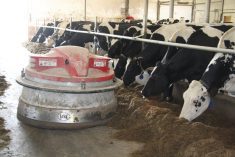The Canadian Wheat Board is one of the main targets in an American investigation involving the cattle trade.
Initiated by the International Trade Commission, the investigation is to satisfy a petition from American cattle producers who feel the board fixes feed barley prices.
They have heard various explanations of how feed grain is priced and believe the price is cheaper than what is available to Americans.
“There are some very serious questions about what the pricing structure is and what advantages that gives the Canadian feeder over say, the Montana feeder,” said Keith Bales, president of the Montana Stockgrowers Association.
Read Also

Manitoba extends Crown land rent freeze
Manitoba government links the continued rental rate freeze on grazing and forage leases to economic and environmental challenges facing the industry
The American stock growers want assurances there are no unfair advantages and will accept the results if the investigation shows no subsidies were paid.
Wheat board spokesperson Deanna Allen said the board is prepared for yet another investigation.
Because the domestic feed market is so strong the board only handles a small amount of feed barley.
“It’s a little hard to make the connection with low feed grain prices when prices in central and southern Alberta are probably the highest in the world,” she said.
In the 1996 crop year the board handled 2.4 million tonnes and in 1997 had 261,960 tonnes of feed barley in the pool account.
The board has been investigated six times since June 1990 by two American agencies, the International Trade Commission or the General Accounting Office. There has never been any evidence of price fixing or unfair trade practices, Allen said.
For a cattle feeder, the charges against the wheat board are curious, said Ben Thorlakson, president of the Canadian Cattlemen’s Association.
“Most of us in the feeding business have never bought a bushel of Canadian Wheat Board barley,” said Thorlakson who operates two southern Alberta feedyards.
“It is our contention that the CWB is inconsequential in determining price of Canadian barley. In fact, for the period in question, Canadian barley was not underpriced,” he said.















